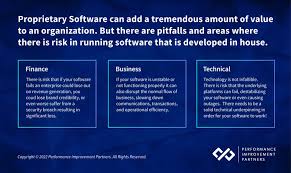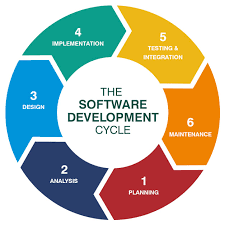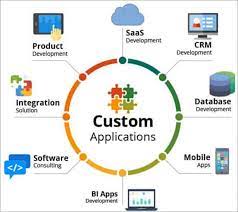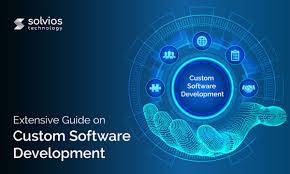Empowering Your Business with Custom Software Development Solutions
The Importance of Software Development Solutions
In today’s digital age, software development plays a crucial role in the success of businesses across various industries. Whether you are a startup looking to build a custom application or an established company aiming to streamline your processes, investing in software development solutions can provide you with numerous benefits.
Efficiency and Productivity
Custom software solutions are tailored to meet the specific needs of your business. By automating repetitive tasks, optimizing workflows, and integrating different systems, software development solutions can significantly enhance the efficiency and productivity of your operations.
Competitive Edge
Having unique software that caters to your business requirements can give you a competitive edge in the market. Custom-built applications can differentiate your offerings from competitors, attract more customers, and improve overall customer satisfaction.
Scalability and Flexibility
As your business grows, off-the-shelf software may no longer suffice. Custom software development solutions are designed to be scalable and flexible, allowing you to adapt to changing business needs and easily expand or modify the functionality of your applications.
Data Security
With the increasing threat of cyberattacks and data breaches, data security is a top priority for businesses. Custom software development solutions enable you to implement robust security measures tailored to your specific requirements, ensuring the protection of sensitive information.
Cost-Effectiveness
While custom software development may require an initial investment, it can lead to long-term cost savings. By eliminating the need for multiple off-the-shelf applications and reducing manual processes, custom software solutions can optimize resource allocation and improve overall ROI.
Conclusion
Software development solutions offer businesses a strategic advantage by providing tailored applications that address their unique challenges and opportunities. Whether you are looking to streamline operations, enhance customer experiences, or drive innovation, investing in custom software development can pave the way for sustainable growth and success.
Maximize Business Success with Tailored Software Development Solutions: Efficiency, Security, and Growth
- Customized solutions tailored to specific business needs
- Enhanced efficiency and productivity through automation
- Competitive advantage with unique software offerings
- Scalability to accommodate business growth and changing requirements
- Improved data security with tailored security measures
- Long-term cost savings by optimizing resource allocation
Key Challenges in Software Development Solutions: High Costs, Time Demands, and Maintenance Hurdles
Customized solutions tailored to specific business needs
Customized software development solutions offer businesses the advantage of having applications specifically tailored to address their unique requirements and challenges. By aligning the functionality and features of the software with the specific needs of the business, organizations can optimize their operations, improve efficiency, and enhance overall productivity. Customized solutions not only streamline processes but also enable businesses to adapt and scale according to changing demands, ultimately driving innovation and competitive differentiation in the market.
Enhanced efficiency and productivity through automation
Enhanced efficiency and productivity through automation is a key benefit of software development solutions. By automating repetitive tasks and streamlining workflows, businesses can significantly increase their operational efficiency. This not only saves time but also reduces the likelihood of errors, allowing employees to focus on more strategic and value-added activities. Automation empowers organizations to accomplish more in less time, leading to improved productivity levels and overall performance.
Competitive advantage with unique software offerings
Custom software development solutions provide businesses with a significant competitive advantage by offering unique software offerings tailored to their specific needs. By creating custom applications that stand out from generic off-the-shelf software, companies can differentiate themselves in the market, attract more customers, and enhance overall customer satisfaction. This ability to provide distinct and innovative software solutions gives businesses an edge over competitors and positions them as leaders in their industry.
Scalability to accommodate business growth and changing requirements
One significant advantage of software development solutions is their scalability, allowing businesses to accommodate growth and adapt to changing requirements seamlessly. Custom-built software can be designed with scalability in mind, enabling businesses to expand their operations, add new features, and handle increased user loads without major disruptions. This flexibility ensures that the software can grow alongside the business, providing a sustainable solution that supports long-term success.
Improved data security with tailored security measures
One significant benefit of software development solutions is the enhanced data security they offer through customized security measures. By tailoring security protocols to specific business requirements, organizations can effectively safeguard their sensitive information from potential cyber threats and data breaches. This personalized approach to security not only ensures a higher level of protection but also instills confidence in stakeholders regarding the integrity and confidentiality of their data.
Long-term cost savings by optimizing resource allocation
One significant advantage of software development solutions is the potential for long-term cost savings through the optimization of resource allocation. By creating custom software tailored to specific business needs, companies can streamline processes, reduce inefficiencies, and eliminate the need for multiple off-the-shelf applications. This strategic approach not only leads to improved operational efficiency but also maximizes ROI by ensuring that resources are allocated effectively over time. Ultimately, investing in software development solutions can result in sustainable cost savings and long-term financial benefits for businesses.
Costly initial investment
Custom software development solutions often come with a significant con of a costly initial investment. This can be particularly challenging for small businesses operating on limited budgets. The expenses associated with custom software development, including planning, design, implementation, and testing, can add up quickly and may strain financial resources. Small businesses may find it difficult to justify the upfront costs of custom software when compared to off-the-shelf solutions that offer a more affordable alternative. As a result, the high initial investment required for custom software development can be a major deterrent for small businesses seeking tailored solutions to meet their specific needs.
Time-consuming implementation
One significant drawback of software development solutions is the time-consuming implementation process. Building custom software entails meticulous planning, intricate development work, and thorough testing phases, all of which can contribute to delays in deploying new functionalities. The intricate nature of crafting tailored software solutions demands careful attention to detail and comprehensive testing to ensure functionality and reliability, ultimately extending the timeline for implementation and potentially impacting project deadlines.
Maintenance challenges
One significant drawback of custom software development solutions is the maintenance challenges they present. Unlike off-the-shelf software that often comes with automatic updates and support, custom applications may require continuous attention to remain functional and up-to-date. Keeping pace with evolving technologies and adapting to changing business needs can be a time-consuming and resource-intensive process, making ongoing maintenance a potential burden for organizations investing in custom software solutions.












